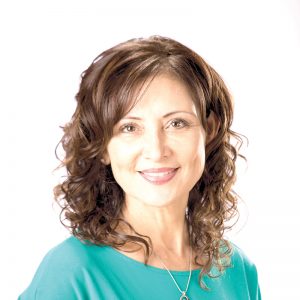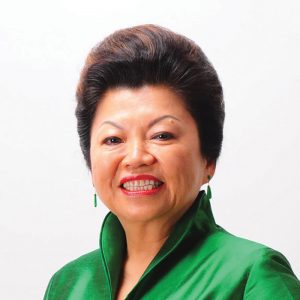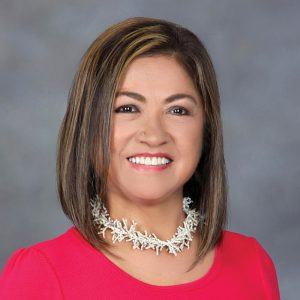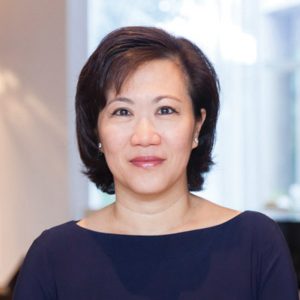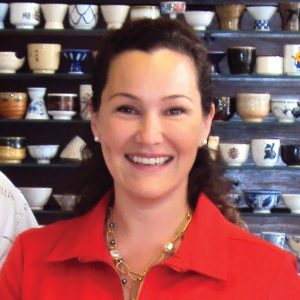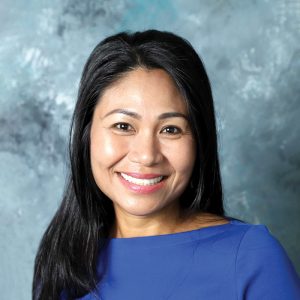How outstanding businesswomen are operating through the COVID-19 pandemic
By Maureen N. Maratita and Morgan Legel
This year there will be no Guam Business Magazine Businesswoman of the Year feature with nominees and an awardee, because of the effect of COVID-19 has had on all our communities.
But since 2020 is the 15th Anniversary of Businesswoman of the Year, Guam Business Magazine is celebrating that occasion with a Survival Webinar and this feature.
We thank the Businesswomen of the Year for sharing some frank insight into each of their situations. Their words will surely resonate. How they are handling their responsibilities day-to-day may re-enforce your own ideas and solutions — or offer you some new strategies or food for thought.
The grocery and food industry in general are very dynamic, Katherine R. Calvo says. Celebrating the Pay-Less 70th anniversary this year, she says, “We had a whole lot of plans.” But the idea of being adaptable and changing plans is inherent in the industry, she says. The wellbeing of the chains 800 employees and customers is always foremost, Calvo says.
“At the end of February, we identified one individual who was going to be the repository of all the information and distribute information. … We’ve had many challenges within our company — changing promotional plans, having to close down our eduKitchen, the bulk bin area; there has been some disruption in the flow of goods from our suppliers.”
Pay-Less has been aggressive in sourcing goods to maintain supply and price stability, Calvo says. “There was a panic buying initially which resulted in the suppliers and manufacturers pulling back. We’ve had to be resourceful,” she says. “One of the things that we did do at the onset … was to put a halt to price gouging. That’s been something that we’ve held to … but it’s impacted our gross profit margin,” Cavo says. “We’ve tried to be very resourceful with our buying and we have not raised our prices.”
As to how Calvo personally copes, she describes early morning running as always being her saving grace. “There’s also a cohesive group of people I run with. Because nobody is traveling, … we’ve had some fun explorations throughout the island; places we haven’t been to in a while like Tarzan Falls … or Seti Bay and we’ve created our own adventures. I think we all have to be in the mindset that we can’t help where our situation is today, so we have to embrace it and make the most of it.”
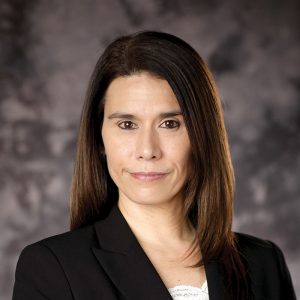
Christine Won Pat Baleto
2007 Businesswoman of the Year
Chief financial officer, Docomo Pacific Inc.
All of telecom industry rose to the COVID challenge, Christine Won Pat Baleto says. “Even before the islandwide lockdown, I know from the Docomo side we had already been talking about how are we going to support the work from home needs of our community, not knowing at the time how deep that would run …,” she says. I think our colleagues in the telecom industry [GTA and IT&E] – both of those companies had to meet the demand of their customers … ,” she says. Docomo’s call center was overwhelmed she says due to the added need for data. “Some schools did not close down, so there were students that needed to do homework and go online to their Google classrooms, so you had pretty much a multi-generational need in the home of having to access data or to use their cellphones. … Even though a lot of businesses have opened, there’s still quite a bit of companies that are doing a Work from Home.”
Telecom companies assisted financially, Baleto says. “We likewise deferred payments on customer accounts; we also waived the late fees and penalties.” Docomo also worked with customers on payments. “We recognized that after three or four months of not paying your bills it doesn’t mean that you’re going to have the resources to pay that bill, once we reinstituted the need to pay.”
Baleto says people have become busier with less down time to drive to meetings and constant online meetings. “… It’s almost to the point now that the only time I can get to emails is 4 o’clock in the morning or 9 o’clock at night. I think everybody is struggling with that; struggling to find that balance and struggling to juggle all the different roles and responsibilities — our community services, our businesses … .” She says it’s a constant reprioritization of those responsibilities.
What Baleto does make time for is daily time with family. “Because of the lockdown, we made it a point to come together for dinner every night and that I really enjoy because … I feel the silver lining has been in this pandemic is we’ve had to reconnect with our families and re-affirm how important they are in our life.”
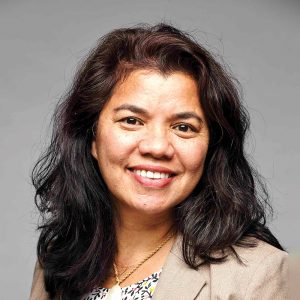
Julienne P. Duenas
2008 Businesswoman of the Year
Owner, Sports Orthopedic and Active Rehabilitation Physical Therapy
Before the new millennium came to fruition, Julienne P. Duenas was beginning her career at Sports Orthopedic and Active Rehabilitation Inc., where she continues today.
During Guam’s first stretch in PCOR 1, all businesses, except for essential ones, were shut down. While physical therapy was deemed essential, Duenas says, “As a physical therapist in the outpatient clinic world, I decided that while we were important to the community, we were not an essential capacity.” The clinic partially opened its doors, keeping only post-surgical and acute injury clients and from Mar. 16 to June 1, the clinic saw limited patients, about three a week, according to Duenas. “Money was not the priority; health and safety was more important,” she says.
She also says the transition into a COVID-19 positive Guam was not as hard for SOAR as it might have been for other businesses and industries. “Being a healthcare facility, we were already in the practice of wiping down surfaces and equipment between clients, but now we must wipe down everything they breathe on.”
Duenas says, “The challenge is the cost to do business at this rate. We still have limited capacity for patients due to social distancing, but it is getting better. Our current recovery is expanding services to more pelvic health and strength and conditioning programs.”
Duenas spent time learning about off-island practices, telehealth and virtual visits. She says she initially encountered a small amount of panic towards the beginning of the pandemic, but with a couple of breaths and a few prayers, she decided she was going to take the opportunity to look into her business and “start sharing the responsibility for the direction of the company” with her staff.
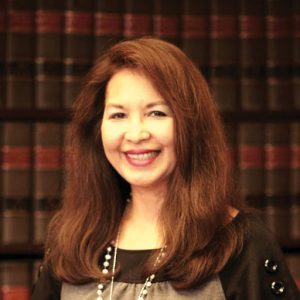
Lorraine S. Okada
2009 Businesswoman of the Year
Chief financial officer, president and human resources consultant, Okada Managing Consulting Service
Lorraine S. Okada has more than 40 years of expertise in the human resources industry and has served on a variety of civic boards that recently include Guam Community College Foundation’s board of governors and the Guam Women’s Chamber of Commerce.
No amount of experience and community involvement could prepare her for the descent of the Coronavirus on the population of Guam.
Okada had to adapt personally, technologically and within her business. “It’s all about people — not being able to see their full face; facial expressions are a key to communications. Getting used to the face mask is a challenge in itself. I find myself hyperventilating at times,” she says.
However, she says the silver lining has been her familiarity with technology. “Since my line of business is human resources consulting, I’m able to use technology as a way to conduct my business — I use Google and Zoom to conduct training sessions, client meetings and one-on-one consultation.”
While the technological aspect was a relatively easy change and emphasis, many of Okada’s employees were faced with financial challenges. She did refer them to pandemic relief programs, helping them to sustain their earnings.
But her business did not only experience employee difficulty, but Okada has had to face the difficulty of her clients as well. “My clients come from diversified industry, and they are all hurting. If they do not recover, my business doesn’t recover,” she says.
Since her retirement as founder and president of Kenghis Khan Furniture Co. — a business she ran successfully for 40 years — Anna Kao says she has been busy. She retired a decade ago; but remains active socially and in the business community.
Somehow, one thing led to another, she says.
She became president of the Chinese School Foundation in July. “This is the fifth time,” she says. “I’m doing the cleaning up to get some tenants and utilize the place.” She foresees the campus in Upper Tumon being used for additional teaching and possibly gatherings. “We have a little club on the second floor.” In addition, she is president of the Taiwan Business Association. “I was elected in the early part of this year,” she says.
During COVID-19 she says, “I mostly stay home.” However, “home” is Ocean Villa Guam, which is beachside on Agana Bay in Tamuning. Kao is continuing to upgrade the 22-unit property and develop its gardens with a variety of local plants and fruits. The business re-opened as an Airbnb but now has a variety of tenants — from the Federated States of Micronesia, doctors, and United Airlines personnel.
“I never really had time to stay home,” Kao says. “Gardening; planting — that makes me happy.” Kao says Guam is a good place to be, despite suffering from COVID. “I think we’re very fortunate … with all the fresh air and the sun.” And she says, “It’s not so crowded.” People take safeguards on-island, she says.
Kao donated masks, thermometers and robes to the administration and Guam Memorial Hospital, which she ordered in March. She says, “I knew it was going to be bad.”
As the automotive industry is deemed an essential business, Joyce Q. Crisostomo hasn’t missed a beat in her role as executive director at Cars Plus.
Cars Plus is a family-run group and Crisostomo says that this is a hard time for most families. “We are a hard-working family that is very hands-on in the businesses, and seeing much of the kids’ time spent on homeschooling and childcare [for the grandchildren] is not something we could have predicted, but they are making it work and balancing as best they can,” she says.
While the sales department was in limbo for a short time, service and parts operations continued on, she says. A month into the lockdown, in early April, automotive sales were back with vengeance, as they were then able to reopen.
“Pent up demand from March through May has allowed us to see light at the end of the tunnel — with public assistance coming in as well as the continuation of tax reimbursements, consumers are spending,” she says. “Those who have been thinking about purchasing a car now have a down payment to make that happen, customers who’ve needed major repairs or maintenance on their current vehicle now have the ability to get it taken care of.”
Even though the demand for automobiles is thriving, Crisostomo says it has still been a tough to work through and bad for the bottom line.
“It’s been a very challenging year for everyone but the changes we’ve made were all for the health and safety of our team and our customers,” she says. “We’ve invested in masks, disinfecting supplies and signage; this has added significantly to our expenses, but it’s worth every penny if we can keep everyone healthy.”
At the end of the day, Crisostomo says, “We will continue to look on the bright side and pray for the best. All we can do is continue operating to the best of our ability, follow all safety guidelines, keep our employees working, and take care of our customers.”
She also is an avid proponent of community service; she is the immediate past president of the Guam Memorial Hospital Volunteers Association and a lifetime member. She says everybody can still find a way to give. “It also helps you as a person. It’s not only about raising the money — it’s difficult times for everybody, even for businesses. You can still help by bringing food to a neighbor, doing something at the hospital, helping [to provide] for food pantries and the homeless.”
Mary P. Rhodes has been the face of the tourism and hospitality industry in Guam in recent months and says for her members, “It’s actually been rather challenging. A lot of businesses are trying to find their way — not just from a revenue perspective, but even operations, and how to care for [their] employees and how to manage those schedules when they do bring them back.”
She says many businesses cannot employ all their team members. “That is what’s so disheartening about the situation. We are working with a lot of employers because as things continue to be fluid and things change, it’s very difficult to make these business decisions in such a difficult climate.”
Rhodes says in her 14 years with GHRA, she has never seen a situation that has such impact on all businesses and into the community. Nevertheless, she says, “I’m really hopeful that … everybody will streamline, cut back and really find efficiencies so that they can get back to the heart of what it is that they deliver on a daily basis.” She says restructuring and new foci may have to take place. “Consumers will be extremely discriminatory in how they purchase; how they spend their dollars. I think businesses will be challenged — but in a good way to identify ways that really make them stand out and make consumers continue to want to support them,” Rhodes says. The majority of her time now is spent “advocating for the industry,” she says. Tourism must also prepare to re-open she says.
While she misses her adult children who are off island, Rhodes says, “But at the same time I know they’re doing well and they’re staying safe.”… On island, she says she was careful due to potential exposure to COVID. “I couldn’t see my family for a couple of months; I had to go into isolation myself. … I think I’ve had a COVID test once a month since May.” Rhodes says some businesses are taking that initiative. “Public Health can’t be the only agency to discuss the contact tracing and possible exposure. … We all have a corporate responsibility and a social responsibility as individuals and leaders … to lead by example.”
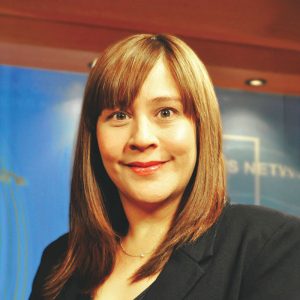
F. Marie Calvo-Monge
2013 Businesswomanof the Year
CEO, Pacific Telestations LLC, which does business as KUAM Communications
Surviving a pandemic as a business is no easy matter, and media outlets are no different.
F. Marie Calvo-Monge says, “We’ve made adjustments and have had to face changes — most significantly pivoting our AM station to a streaming and digital operation to streamline and cut costs. We’ve responded to the needs of our community,” she says in creating a flagship morning news program across broadcast and digital platforms. “We’ve also changed the brand and format of our FM radio station to appeal to advertisers, a wider audience base and a demographic still reliant on this medium. Our survival to date can be completely attributed a willingness to adapt, adjust and make necessary changes.”
She says the group adapted quickly by embracing and utilizing technology to communicate with one another and colleagues for business and for news gathering purposes. “Apps and platforms such as Zoom, Whats App and mobile production tools have been a saving grace for continuing to interact, create news content and stay connected to the community.”
Technology aside, media outlets and groups play a special role during community challenges.
“As a media group, we have a critical role and responsibility to inform the community about important news, advisories and developments,” she says. “As such, we still had to operate around the clock but adapt our operation to ensure the safety of the essential members of our team.”
KUAM has faced a dip in revenues as an effect of the economic impact; from advertiser businesses facing closure to loss in revenue for KUAM; she says the pandemic has taken a toll on the business, and that the end is not nigh. “Unlike preparation and recovery for a natural disaster, the events and effects of the Coronavirus are lingering, rapidly evolving and offering no end in sight. These are unprecedented times and we are bracing for more challenges with our economy in peril.”
She says a bright spot for her is the reliance on local news to include broadcast news. “Local media is a trusted source for the most reliable, up-to-the-minute and accurate information. Our team has a passion and commitment to the community. We have been a trusted resource for over 66 years,” she says.
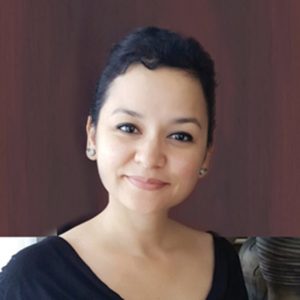
Shirley Ann T. Sablan
2014 Businesswoman of the Year
President and CEO, Pacifica Insurance Underwriters Inc. (Saipan)
Shirley T. Sablan says all things considered, the Northern Mariana Islands has fared well. “Pacifica Insurance Underwriters has always planned ahead. “We were able to save for ‘rainy days.’ We are pretty good in tightening our belts whenever needed.” While business continues for her company, she says, “We can never be too optimistic. Since the declaration of the State of Emergency in the NMI at the end of January, she says, “We’ve taken all necessary steps to ensure that we safeguard our staff — our team and that we produce a secured and safe working environment … ,” for clients as well, she says.
After two typhoons, Sablan says, “We were on the verge of recovery.” Despite a contingency plan at Pacifica, she says, initially the pandemic was an unknown type of crisis. “Fast forward to today and we know how this virus behaves and we know what to do to take all necessary precautionary measures to keep ourselves safe and the community safe.”
As a leader of her organization, Sablan says her concerns are “having my staff depend on me for my leadership and my direction to ensure that they’re on payroll, that they’re kept payroll and they’d able to go back to their homes … to be able feed their families.”
In a service industry like insurance, Sablan says a business does not have tangible goods. “We sell service and our best asset is our human resources. I wanted to make sure our staff had the best resources.”
Insurance is essential in a crisis. “We stepped up to the plate and we had to be there. … We needed to be present.” Pacifica closed for a week to allow staff time to prepare, she says.
Aside from work obligations, Sablan has six children and a large extended family. “For as long as I can remember I’ve been trying to strike a balance … .” Now, she says she has more quality time with her family. “There’s some very obvious changes at home — we’re home seven days a week, and rightly so. … “ What she learned, Sablan says is, “I had such a busy schedule. I never could find time for self-care or time to reflect. That’s exactly what I got from this situation.”
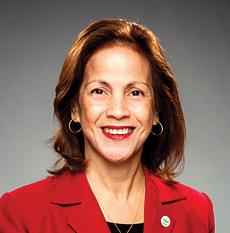
Joann G. Camacho
2015 Businesswoman of the Year
Deputy administrator, Guam Economic Development Authority
“When COVID-19 first happened, it was kind of a different type of experience. Having to shut down and have everyone go home — I was fortunate that [DFS] took care of everyone in the first month,” Joann G. Camacho says. She was working at the duty free company as director of market development. Then things got tougher and she says, “Between furloughing and terminating, it was heartbreaking … because we didn’t expect it all to happen at one time.”
Even though DFS was downsizing and restructuring, Camacho says the company still made donations to the community.
Those included “2,495 masks to the governor’s office for the medical staff and we also gave a lot of chocolates to the people involved in the pandemic,” she says.
Camacho transitioned jobs, leaving DFS to work for GEDA.
“I find myself fortunate and remain positive that we are in this together — really, that’s all you can do,” she says.
Camacho says despite the difficulties of the pandemic, there have been special moments. “The best thing COVID did for Guam, is we all have lives, the hustle and bustle of work, school, children, activities.” With lockdown, she says family came to the fore. “With spending more time with my grandchildren and children — being locked down really forced us to spend quality time together, appreciate each other and help each other out.”
The key to surviving the pandemic, she says is to “pause for the cause,” and re-evaluate life and your priorities for the best. “It’s going to take all of us working together — everyone is affected one way or another. There are definitely going to be some changes in how things are done, but it’s going to be good,” she says.
Sophia Chu Wigsten says initially she and the Hyatt Regency Guam team swung into action with experience gained through previous pandemics. “When this all started and it started to impact our business, we thought, ‘Okay, we have a couple of months we have to bear through and make some decisions that will get us through to the other side … .’ Who would have imagined that five months later we’re not on the other side and not even knowing when that other side is going to come.”
Hyatt continues to adapt, she says. “Our decisions are changing so frequently and that has presented a challenge, because we like to work in very structured environments and have good plans in place.”
The hotel has always prioritized health and wellbeing, Wigsten says. “But it’s become more critical to do now — the wellbeing of our guests, colleagues as well as ourselves. We speak to our teams every single day; we ask them how they’re feeling; is there anything more we can do to keep them feeling safe. We speak to our guests, so that they can provide us feedback on what we can do better.” People who come to the hotel must feel safe, Wigsten says.
Business has come back with the opening of some of Hyatt’s restaurants — Niji and the Deli — though at reduced capacity. Staycations have been very popular, she says. “It’s just nice to see.”
Home life has settled after unexpected changes, Wigsten says.
“This was a big year for us as a family. “[My older daughter] was turning 18; she was graduating high school; she was heading off to college. My younger daughter was going into high school for the first time as a freshman.”
The college did not open its dorms. “She will be staying here and taking online classes…. We had planned for everything — her 18th birthday, her graduation — we’ve been talking about it since last year … it’s hard.” Still she says, there are plusses. “The important thing is … making sure everybody stays healthy — and we get to spend more time with her.”
Ramona L. Jones says Jones & Guerrero is a conglomerate, so a large part of its business is food wholesale and distribution. “But we are also a commercial landlord and that means that we’re exposed to a lot of different businesses from travel agencies, restaurants and insurance companies …,” she says. Plus, with Town House Furniture and copiers also among its business lines, she says, “We have an ability to see what’s going on in the economy.”
Since the COVID picture was so difficult to analyze, Jones says from her vantage point she said, “Let’s be very back to basics — what are our revenues, what are our costs? Of the costs, which ones are fixed. This is just Business 101. The promotional calendar … let’s just table it. …” J&G also examined its inventory, she said. “Initially we were looking at things that would be expiring in the next 90 days.”
Taking her late father’s examples to heart, Jones says, “From that lesson I learned: make sure that you communicate with your banks; make sure that your cash flow can sustain your business … and now, make sure that you know what the government is offering.”
Seeing what national companies were doing, was helpful, she says. Creating that framework … and communicating that to your employees created a way that we could sail through rough water and keep our head above,” she says. The uncertainty is how long COVID will continue, Jones says. She quotes her son’s swimming instructor who told her, “You’re either drowning, you’re treading water, or you’re moving forward.” At this time, she says, “We’re done treading water; we’re moving forward — that’s where we are.”
Jones says she is fortunate to be close to her teams at J&G.
“When I came into the management of J&G I had had a chance to work up through the ranks and I to know people as my boss, and then later on as their coach and leader. There’s a good trust that we have among one another and an openness and I think that was really helpful.”
The corporate office remained open, she says, with other divisions — some with essential services — coming on-line as quickly as possible. “Micronesian Brokers — the wholesale division was always open.”
Jones focuses on the positives of the COVID situation, she says. “It is tough, but How nice is it that we get to go to work so quickly in the morning.” She says it was a positive that COVID happened during Lent. “It really gave us a time to reflect. … There are good things you can look for.”
Mary Grace D. Jacot began her decades-long career in finance and loan management, but soon joined her husband in the electric industry, where she quickly became president and sole owner of their company after the couple purchased SET in 2010.
SET has consistently received the highest safety awards from various entities throughout the years, and Jacot has taken the pandemic, and the safety of her company, to heart. With safety paramount, she says SET has continued as an essential business, with work on six projects at Naval Base Guam and Andersen Air Force Base. Jacot says so far, 2020 is one of SET’s busiest years to date.
However, she says, some of her employees did have issues with working towards the beginning of the pandemic.
“It was definitely a problem at first, we had a few employees that refused to come into work during the lockdown,” she says. “Unfortunately, I am not in a position to let go of or fire employees, so we just had to wait until they were ready to return to work. Safety is the utmost priority for our employees, so we just have to continue to advertise and engage employees.”
With new safety standards and making sure employees are comfortable, Jacot still says that one of the biggest challenges she has overcome has been with her family.
“It has been tough on me as a working mother, with two kids under 12 years old; they weren’t old enough to be left at home and the distance learning was taking a lot of my time from work. I had to take them to the office with me a few times, actually,” she says, also recognizing that family time is precious.
Professionally she says, her ultimate goal is “to complete all of [the] projects accident-free and without any delays.”
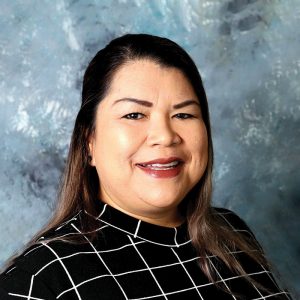
Jessica Barrett
2019 Businesswoman of the Year
President, Barrett Enterprises Inc., dba as Barrett Plumbing
The construction industry was considered essential, Jessica Barrett says, speaking also as immediate past chair of the Guam Contractors Association. “It was nice to be able to be able to operate, butt there were so many unknowns … so many risk factors, things that we had to consider when we were sending our guys out, when we were actually going out to supply stores.” Each day brought different challenges to Barrett, she said. “We tried to be there to service our customers; especially with people being home, you can’t have them having a backed-up toilet, so we had to be there to service our customers for quality of life stuff.” Tasks would take longer, backed-up traffic was an issue as well as the increased cost of goods, she says. Also, Barrett says, “We also had some employees that are single parents with young children; ‘Safety first.’ They had to take off.”
She says non-essential work was tabled. “We had a shorter workday; it balanced out for those that had to go.” However, essential work is relentless and stressful during COVID, she says. “There’s just so many different things that play a role in the whole operations of your business. … It’s given us a lot of insight.” Military work on Guam’s bases has not stopped, she says. “We can’t stop… You still need those buildings. They’re building [them] for a reason.” Still, the construction industry had to face challenges to working safely. “Keeping social distancing when you’re trying to lift an 80-pound appliance or a water heater that’s loaded – it’s impossible.” Still safety and distancing had to be followed, and staff trained, Barrett says, even though cleanliness is already practiced in that line of work. “I told them it’s important for your co-workers, for our customers and … your families that you go home to. … I told them, ‘You guys have to think of your families first, because that’s what you work hard for.”
With two young children and as a single mother, remote learning has been a challenge to overcome, Barrett says. “I had a really tough time with that, trying to help my kids with their homework and getting them on schedule. … Whenever I had issues, I would call the teachers, and luckily, they were responsive,” she says. Barrett tried to leave her work concerns ‘at the door,’ she says. “It was a struggle to get the stress levels down, and try to be Mommy, and not worry about everything else.” Barrett used apps to order food for her and the children. “I wouldn’t take them with me.” The situation till now has been about “adapting to trying to get stuff done safely and get back home.” On the positive side now, she says, “We’re getting to where my kids are trying to pick up some of the slack.”


